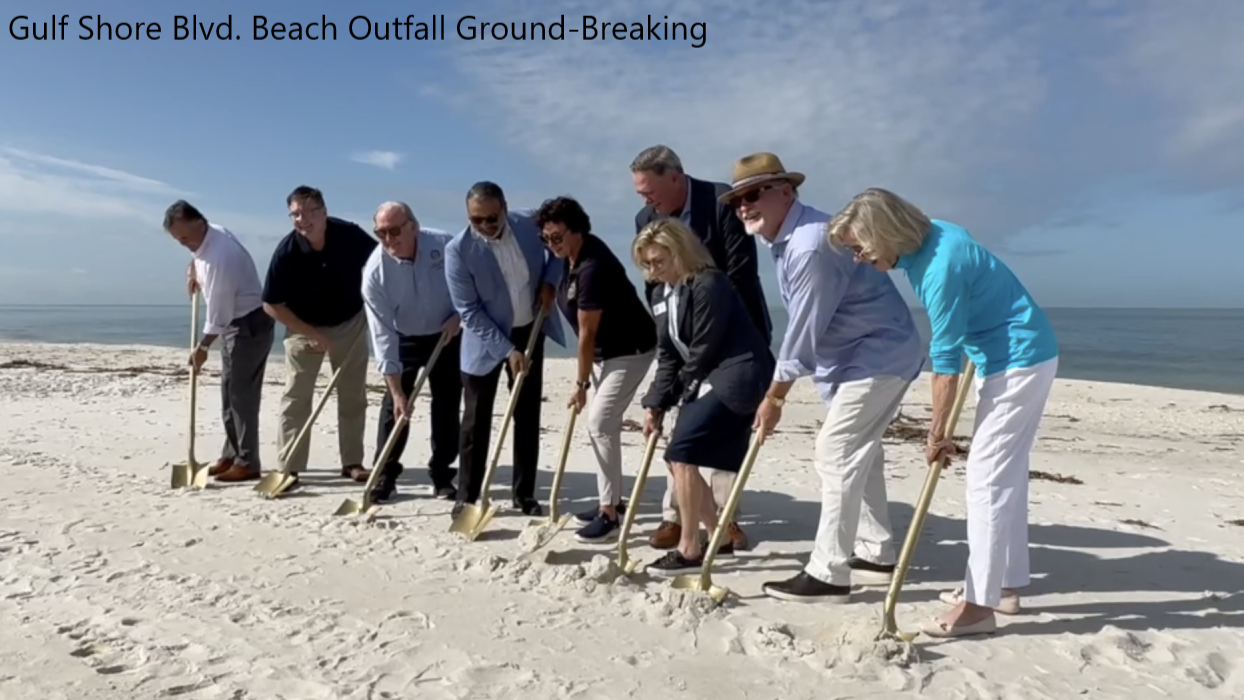Protect & Enhance Naples's High Quality of Life
Naples’s quality of life is our most cherished and visible community asset:
- National survey after national survey, Naples ranks as one of the best places to live, work, and retire in America. It is why Naples has become one of the top cities in the country for second homes. And it is why the protection and enhancement of our quality of life is foremost on most residents’ minds.
- We have a beautiful natural environment anchored by over 8 miles of magnificent unbroken beaches along our Gulf. Our town is lushly landscaped including a nationally recognized canopy of over 20,000 “city” trees. We live in a very safe and secure town, where crime, particularly serious crime, is low. Naples is a walkable and accessible community, with an outstanding park system.
- Naples is experiencing ever greater pressures because of the very qualities that attracted all of us here. This has meant more traffic, congestion on our roads, and greater influxes of visitors to our restaurants and beaches. And it has meant ever greater interest to build in Naples, largely through redevelopment of older properties, as well as more dense development in areas of Collier County bordering our city.
- Naples will continue to receive these growth pressures. While they may ebb and flow through different economic cycles, they will always be impacting us.
We must protect and enhance our already high quality of life. This is the core element of my platform as I stand for election. I commit to you that I will continue to work with you to achieve that overarching goal.
To accomplish that, I believe there are four Key Priorities, each of which directly impacts the quality of life for each of us and the success of our community:

Public safety is the cornerstone of any strong community – and it must be a top priority for any elected leader.
Naples remains one of the safest cities in the country, a fact confirmed by national surveys and proudly acknowledged by residents and visitors alike. It is a key part of what makes our city so attractive as a place to live, work and visit. However, safety can never be taken for granted.
As Naples, and our neighbors in Collier and Lee Counties, continue to grow, new challenges emerge: increased traffic violations…youth violence with firearms…scams targeting older residents…and the complexities of managing safely large public events. These are daily realities for our police, fire, and EMS first responders.
When I was first elected in 2019, it became clear to me that our city had fallen behind in supporting those who protect us. Following the 2008 financial crisis, the city froze wages and cut benefits for its workforce, including our first responders. But as the economy improved, Council never took action to properly adjust compensation.
By the early 2020s, we were near a crisis, particularly with respect to our police officers, which had a vacancy rate of over 30%. We were struggling to compete for personnel with neighboring jurisdictions that offered better pay and benefits.
I have been a strong, consistent, and leading voice on Council advocating for significant and appropriate compensation increases for our first responders (and other employees as well). In 2021, we approved a three-year agreement that increased compensation for our police officers by nearly 30%, followed by a second agreement in 2024 that provided additional compensation and benefit adjustments. Similar adjustments were made for our fire and EMS personnel.
These actions by City Council have made Naples once again competitive relative to our peers in attracting and retaining talented first responders. We now rank at the 84 percent level in terms of compensation for our police officers relative to comparable local jurisdictions. Council set a goal of being one of the leaders among local governments in Southwest Florida in compensation for our public safety personnel and we are meeting it.
But providing a competitive and attractive workplace is a never-ending task. As Naples adjusts compensation and benefits, so do other communities. And we need to remember that compensation is only one important factor in building a strong public safety team.
We have also invested in leadership, hiring Ciro Dominguez as our new police chief in 2023. Chief Dominguez has built a new culture in the police department, stressing service and responsiveness to the community and rapidly and effectively addressing crime problems when they occur.
I experienced first-hand earlier this year the quality and commitment that resides within our police department when I was part of the 2025 Class of the Naples Citizens Police Academy. I was the first City Councilman to participate in the Academy’s program in its nearly 15 year history. It provided me with further insight on the challenges and complexities of police work and how talented and dedicated our team is here in Naples.
I commit that I will continue to do all I can as a member of Naples City Council to provide the funding and other resources necessary to support our police and other first responders.

Naples has been hit by five hurricanes in the last three years. Three of them – Ian, Helene and Milton – were particularly damaging for our community, much of Florida, and beyond.
These events have changed the perspective of our residents regarding the growing risk of flooding in a time of warming temperatures and rising sea levels. We know from existing data that there has been an 8-inch sea level rise in our Gulf between 1990 and 2020. NOAA mid-level forecasts project a further increase of between one and three feet by 2070.
But the flood risks Naples faces are not just with occasional hurricanes, destructive as they can be. The changing climate is also generating more frequent and intense rainfall events that can overwhelm our stormwater infrastructure, flooding roads and even homes.
Naples has a 20th century infrastructure system trying to accommodate a 21st century climate. I commit to you that I will continue to do all I can to make resiliency planning and investment a top priority for City Council.
The good news is that we have already done a lot. With my support and that of others, the city completed in 2021 a Climate Vulnerability Assessment and in 2024 a Climate Adaptation Plan with 47 strategic initiatives. To date, we are the only local government in southwest Florida to have taken these basic steps.
During this time, City Council advanced the long-delayed $100 million Gulf Shore Boulevard Beach Outfalls project, which in addition to replacing the antiquated outfall pipes on Naples Beach, will provide new stormwater management infrastructure to reduce flood risk and improve water quality for a 265-acre area of our city. This project is now underway and is scheduled to be completed by early 2027.
City staff, at Council’s direction, has also now conducted “water basin” studies for much of the rest of Naples, providing information on what the next generation of stormwater management investments should include. Based on this, City Council and the Community Redevelopment Agency Board, which I chair, have given next priority to the Aqualane Shores and River Park East communities.
Prior to my election to Council in 2019, I learned that the city’s “system” of 28 stormwater management lakes needed restoration and improvement. With my leadership and that of others, we directed city staff to develop a plan to achieve this goal over a ten-year period. To date, nine lakes have been restored or are in the process of restoration.
I have long advocated that Naples needs an overall vision and plan for how it is going to reduce flood risk for our residents, businesses, beaches, and infrastructure. In September 2025, city management presented this plan to Council based on three pillars:
- Off-shore protection through the development of artificial reefs to dissipate storm surge energy
- On-shore protection through continued beach nourishment and vegetated dunes with native plants
- Inland protection through investment in stormwater infrastructure
This plan will provide for the first time a roadmap to guide city priorities for resiliency planning and investment.
We also need to find a way to pay for the next generation of resiliency investments. While we should continue to work with our federal, state, and local partners in this regard, we also need to identify a city funding source, such as an increase in our stormwater fees.
Finally, we should recognize that efforts to mitigate flood risk for residents and businesses can include actions taken by property owners themselves, such as use of flood panels, other types of floodproofing, and elevation of homes.
These all require adherence to local and state building codes to ensure they are carried out properly and safely. But I believe that our city management should continue to identify ways in which residents and businesses can access these tools and techniques, particularly as they improve through innovation and use of new technologies.
We live in a new era of climate risk today. As a coastal community, Naples must continue to look for ways to update its codes to reduce flood risk for our residents and businesses while also protecting public safety.

The oversight and control of development and redevelopment by our local government is carried out through our Comprehensive Plan and Land development Code. The good news is that both are sound and have served us well over the years.
There is always room for improvement, particularly with changing times and new challenges. City Council is now in the beginning stages of a new update of our Comprehensive Plan to help guide land use decisions for the future. This will involve extensive opportunities for resident input.
The Land Development Code should always be in alignment with the Comprehensive Plan. In my years on Council, City Council has taken a number of important actions to strengthen our code to better guide development:
- We eliminated the ability for developers to seek “site plan deviations” which provided for density, height and setback allowances beyond that allowed by the zoning on the property
- We tightened standards for receiving variances for all development, requiring adherence to code in other than exceptional circumstances
- We enacted an ordinance to clarify the Charter Height Amendment requirement that no commercial structure can be built at a height above 42 feet. This requirement was approved by the voters of Naples in a 2000 referendum but never fully implemented in our code, leading to various administrative interpretations over the years.
- We approved a new Stormwater Management Ordinance requiring all new development to retain one inch of stormwater on property through on-site systems. This doubled the previous requirement and has reduced the burden on the city’s stormwater management system.
- We adopted a new Fertilizer Management Ordinance that includes an annual ban on use of fertilizer containing nitrogen or phosphorus from June 1 through September 30.
I am proud to have played a leadership role on City Council on all of these important accomplishments.
But what about the future? In addition to consistently enforcing our existing codes, there are additional steps we can take to support the kind of quality development and redevelopment we want that can further enhance our Quality of Life.
First, we should modify our Comprehensive Plan and Land Development Code to assist homeowners who want to take steps to rebuild or protect their homes in the face of increasing flood risk. For example, how can we increase flexibility for the location of generators, the elevation of garages, or the elevation of entire houses? Taking action in this regard can particularly assist residents who reside in older, smaller homes in which they hope to remain.
Second, we should continue to find ways to expedite permitting processes. Our Building Department has taken good steps in this regard, including investments in new AI software to reduce the time required to render decisions. But more can be done to increase staffing as needed and establishing firm timelines to benefit our residents and the builder community.
Third, City Council needs to support and facilitate key “community” projects which will benefit all of Naples and beyond. Recent examples include the NCH Heart, Stroke and Vascular Institute, the Gulf Shore Playhouse, and the expanded Sugden Theatre – all projects that City Council ultimately approved but only after taking far too much time that cost the non-profit project sponsors significant additional expense.
These types of projects – because of their size, scale and complexity -- often need modifications from current zoning restrictions. But their importance to our community warrant finding ways to provide support and a path forward in a timely manner.
Finally, we need to move away from simplistic ideological arguments about growth and development. We know that our residents don’t want to see “over-development” of our town. But I believe they also do not want to see us slip into a “no growth, any time, anywhere” mindset that is that overly restrictive, including in our own ability to redevelop aging commercial properties or improve or rebuild our own homes.
I commit to continuing to bring to my work on City Council a balanced and pragmatic approach that emphasizes adherence to our codes, a rejection of development that is incompatible with our existing built environment, and a willingness to work flexibly with petitioners wishing to bring new quality development to our community.

No community can be successful without a growing tax base and a local government that makes sound decisions on the use of those resources.
I view this as one of my highest responsibilities as a City Council member. And I am proud of our record during my tenure on council.
Over the past ten years, the total operating costs for Naples government (personnel and other essential operating expenses) have doubled. But we have been able to pay for these basic needs and still meet, and even exceed, our minimum reserve requirements.
And we have done so while maintaining the 4th lowest millage rate in the state among cities with populations of 5,000 or more (more than 200 localities).
Naples has only 5% of the population of Collier County but accounts for over 25% of the taxable property value in the county.
This strong and growing tax base has allowed us to take much needed actions in recent years to increase salaries for city employees, especially our first responders. We have now become competitive in employee compensation with our peer local governments, something that wasn’t the case when I was first elected to City Council.
We have made investments each year in our parks, medians, streets, and urban forest. These are discretionary investments that many localities must forego due to budgetary constraints. But they are central to the quality of life that Naples’s residents have come to value and expect.
We also have been able to grow our reserves over time, even in the wake of recent events like the Covid pandemic and multiple hurricanes. Our projected fund balance for the 2025-26 fiscal year is projected to be $26.7 million, well above the minimum reserve required by city statute of $17.3 million.
Given the continuing risks caused by more frequent and intense storm events and an uncertain economy, it is more important than ever to have a healthy fund balance reserve.
The challenges around managing the finances of our city will only grow in the future. Inflation continues to increase costs for personnel, operations, and services. And the need to invest in infrastructure to mitigate future flood risk will be substantial.
We have capable professionals managing the finances of the city under the leadership of our City Manager. It is a primary responsibility of City Council, however, to provide oversight and approve final budgets and spending decisions.
My background and experience, coupled with my track record on City Council, demonstrates that I can provide the financial leadership Naples needs for the future. I will continue to make it one of my top priorities.
